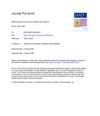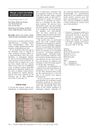 1 citations,
July 2022 in “Journal of Drug Delivery Science and Technology”
1 citations,
July 2022 in “Journal of Drug Delivery Science and Technology” Niosomes and ethosomes can effectively carry the drug spironolactone, potentially improving treatment for hair loss and reducing side effects.
February 2023 in “Archives of Dermatological Research” A multi-tiered treatment approach is crucial for managing hidradenitis suppurativa in patients with intellectual and developmental disabilities.
December 2022 in “Research Square (Research Square)” A multi-tiered treatment approach is crucial for managing hidradenitis suppurativa in patients with intellectual and developmental disorders.
 38 citations,
November 2016 in “Aaps Pharmscitech”
38 citations,
November 2016 in “Aaps Pharmscitech” Nanoparticles with more oleic acid improved the delivery and stability of the drug spironolactone.
 March 2012 in “Journal of Pediatric and Adolescent Gynecology”
March 2012 in “Journal of Pediatric and Adolescent Gynecology” Doctors vary in how they initially test for PCOS, but most agree on using oral contraceptives and lifestyle changes as first treatments.
 May 2021 in “Journal of the Endocrine Society”
May 2021 in “Journal of the Endocrine Society” Transgender females can reach their target estrogen levels using estradiol patches, especially if oral treatments fail or if they're at risk for blood clots. Often, the highest dose patch is needed.
 75 citations,
July 2013 in “The Journal of Clinical Endocrinology and Metabolism”
75 citations,
July 2013 in “The Journal of Clinical Endocrinology and Metabolism” Taking low-dose spironolactone and metformin together works better for PCOS symptoms than either drug alone.
 October 2023 in “Journal of the Endocrine Society”
October 2023 in “Journal of the Endocrine Society” Losing weight and taking birth control pills can greatly improve severe male hormone excess in women with PCOS.
 1 citations,
January 2011
1 citations,
January 2011 The document concludes that androgenetic alopecia is common, has a genetic link, and can be diagnosed and treated with medications like finasteride and minoxidil.
 36 citations,
November 1995 in “Clinical endocrinology”
36 citations,
November 1995 in “Clinical endocrinology” Low-dose flutamide helps reduce excessive hair growth and is even more effective with birth control, without bad effects on blood fats.
20 citations,
December 1994 in “Fertility and sterility” Flutamide combined with a low-dose birth control pill effectively reduces excessive hair growth in women with polycystic ovarian disease.
 6 citations,
November 1993 in “Contact dermatitis”
6 citations,
November 1993 in “Contact dermatitis” Spironolactone in anti-acne cream can cause allergic skin reactions in some people.
112 citations,
April 2009 in “Cochrane library” Spironolactone may reduce excessive hair growth in women but its effectiveness for acne is not supported.
 August 2020 in “Journal of The American Academy of Dermatology”
August 2020 in “Journal of The American Academy of Dermatology” Oral minoxidil can improve hair thickness and a comprehensive treatment approach leads to better alopecia outcomes.
 August 2024 in “Medicine”
August 2024 in “Medicine” Most patients with PCOS were prescribed medroxyprogesterone acetate or oral contraceptives, with some experiencing side effects or needing prescription changes.
 February 2022 in “Scientia Pharmaceutica”
February 2022 in “Scientia Pharmaceutica” Different hair loss treatment ingredients work well with TrichoTech™ vehicles for 3 to 6 months, making them good for use in hair treatments.
 21 citations,
April 2019 in “Endocrinology and Metabolism Clinics of North America”
21 citations,
April 2019 in “Endocrinology and Metabolism Clinics of North America” Transgender patients need proper skin care, especially when undergoing hormone treatments, to manage issues like acne and hair loss.
May 2024 in “Journal of clinical medicine” Spironolactone is safe for treating female hair loss, but the safety of other drugs is uncertain.
November 2022 in “Clinical, Cosmetic and Investigational Dermatology” The combined treatment for hair loss is effective, easy to use, and has mild side effects.
 2 citations,
May 2022 in “JAAD Case Reports”
2 citations,
May 2022 in “JAAD Case Reports” A woman lost all her hair after mild COVID-19, but it started to regrow after treatment with a specific medication.
 26 citations,
June 2018 in “Australasian Journal of Dermatology”
26 citations,
June 2018 in “Australasian Journal of Dermatology” Stopping sunscreen use on the forehead led to hair regrowth in a woman with frontal fibrosing alopecia.
 November 2020 in “Postepy Dermatologii I Alergologii”
November 2020 in “Postepy Dermatologii I Alergologii” Sulfotransferase SULT1A1 activity may predict minoxidil treatment success for hair loss.

The review found that PRP is the most effective treatment for hair loss with few side effects.
 1 citations,
January 2001 in “Endocrine Practice”
1 citations,
January 2001 in “Endocrine Practice” Topical finasteride may help treat facial hirsutism in women.
 12 citations,
December 2002 in “Fertility and Sterility”
12 citations,
December 2002 in “Fertility and Sterility” Spironolactone plus finasteride works better for treating hirsutism.
 August 2007 in “Contact Dermatitis”
August 2007 in “Contact Dermatitis” A woman had an allergic skin reaction to a hair loss treatment containing canrenone.
 66 citations,
September 2008 in “Dermatologic therapy”
66 citations,
September 2008 in “Dermatologic therapy” The conclusion is that the best initial treatment for hirsutism is usually oral contraceptives, with the addition of antiandrogens or insulin sensitizers if needed, and topical eflornithine or laser treatments as supplementary options.
 37 citations,
February 2007 in “Clinical Obstetrics and Gynecology”
37 citations,
February 2007 in “Clinical Obstetrics and Gynecology” The document concludes that treating PCOS requires a combination of drugs to manage reproductive and metabolic symptoms, with more research needed on combination therapies.
5 citations,
July 2020 in “PubMed” Both oral contraceptives reduced hirsutism in PCOS patients, but adding metformin showed no extra benefit.
 54 citations,
August 2017 in “Gynecological Endocrinology”
54 citations,
August 2017 in “Gynecological Endocrinology” Lifestyle changes and weight loss are key for treating PCOS-related metabolic issues and infertility, with various medications available for specific symptoms.






















